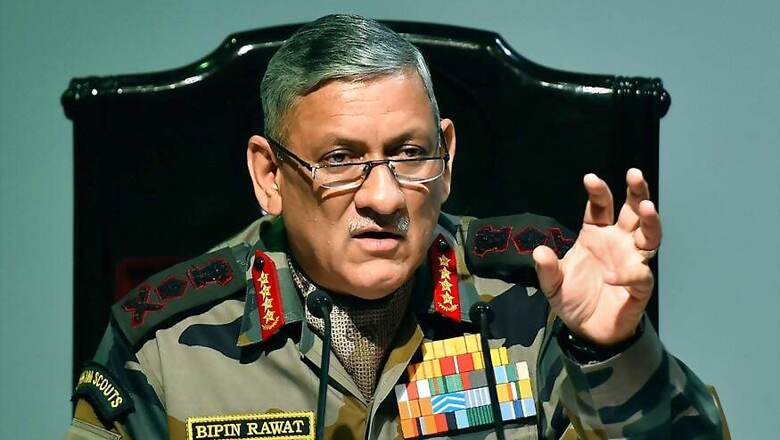
views
New Delhi: In comments that are likely to stir a controversy, Army Chief Gen Bipin Rawat on Thursday said the force was conservative and could not allow gays or adultery.
Homosexuality was decriminalised by the Supreme Court last year, but the Army chief insisted “hum logon ke yahan nahi chalega (all this won’t work here). He accepted that the Army is not above the law but maintained that the Constitution does give it some independence. "We are neither modernised, nor westernised. LGBT issues are not acceptable to us," he said, adding that they would "still deal with the issues under the Army Act".
“In the Army, these are not acceptable. We will not allow this to happen in the Army," he said.
The Supreme Court order striking off parts of the archaic Section 377 of the Indian Penal Code had been hailed as a milestone moment for LGBTQ rights in the country, but it has failed to translate into any change for the soldiers. Laws governing the three arms of the Indian military bar homosexuality and rule it a punishable offence.
Section 45 the Army Act, 1950, talks about the “unbecoming conduct" of officers without detailing it while Section 46 (a) says any person guilty of any disgraceful conduct of a “cruel, indecent or unnatural kind" will, on conviction by court-martial, face up to seven years in jail.
The vague words used in the sections leave it open to interpretation, although the apex court order had stripped homosexual relationships of their “unnatural" tag.
Soon after the SC verdict in September, media reports stated that General Rawat had warned colonels and their spouses of ‘moral turpitude’, saying it was unpardonable. Military legal experts had stated at the time that the implications of the verdict on the armed forces will have to be studied, but there has been no change in the rules so far.
In so far as adultery is concerned, last year, the Supreme Court had struck down a colonial-era law, saying it was unconstitutional, dented the individuality of women and treated them as "chattel of husbands".
Earlier, Rawat had ruffled feathers when he said women were not ready for combat roles. The Army chief had given reasons such as women having the responsibility of raising children and a woman officer feeling uncomfortable at the frontlines or accusing jawans of peeping as she changes clothes.
Meanwhile, Rawat, who was speaking at the annual press conference, said the Army has managed the situation well along the borders with China and Pakistan and there should be no cause for concern. He, however, added that the situation in Jammu and Kashmir needs to be improved further.
"We are only facilitators for peace in J&K," he said. "We have managed the situation well along the northern and western borders," Gen Rawat said, adding that there should be no cause for concern.
With the US and Russia reaching out to the Taliban in Afghanistan, Gen Rawat said, "We have interests in Afghanistan, we can't be out of bandwagon." "The same analogy can't apply to Jammu and Kashmir. Talks in the state have to be on our terms," he asserted.
The Army chief said talks and terror cannot go together, and it applies to Jammu and Kashmir too.




















Comments
0 comment